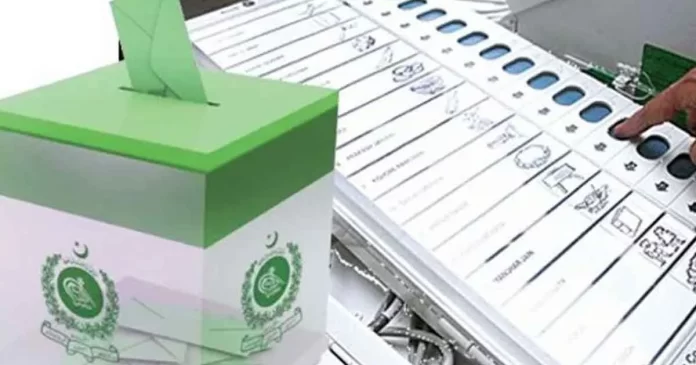Overseas Pakistanis have always contributed to Pakistan in some way. Whether it is sending remittances, lending a helping hand during times of crisis, bringing in business, or simply or supporting the Green Shirts, the Pakistani diaspora has been a flag bearer for their country. Despite this, Pakistan has always had mixed feelings towards overseas Pakistanis, their role on a political level, and whether or not they should be given the right to vote in elections.
The current coalition government might be divided on several issues, but there is a consensus when it comes to electoral reform and not giving overseas Pakistanis the right to vote.
In a recent press conference, former President Asif Ali Zardari, suggested reserving seats for proper representation of overseas Pakistanis in parliament. He also said that issue of overseas Pakistanis and their right to vote was being politicised – an obvious referral to PTI and Imran Khan. Zardari further added that elections can take place once the process of electoral reform is completed.
PTI may have politicized the issue of overseas Pakistanis’ right to vote, but the coalition government’s reasons for electoral reform are also political. The Coalition partners, in particular PMLN and PPP, do not want to hand over voting rights to overseas Pakistanis because of the overwhelming support Imran Khan enjoys among them. They know that their vote bank overseas is significantly smaller than PTI.
This is where PTI has an edge over them. No vote for the Pakistani diaspora would mean cutting into Imran Khan’s base. They know it. And since the fall of Imran Khan’s government after the vote of no confidence, overseas Pakistanis have shown up in solidarity for the former Prime Minister, across the globe, which has definitely gotten under the skin of the current government.
Images of overseas Pakistanis out in full force in the United States of America, the United Kingdom, Spain, France and many other countries, must have rattled the government and reaffirmed their decision to opt for electoral reforms.
But it is in London, where former Prime Minister and PMLN leader, Nawaz Sharif resides, that has seen significant protests. Starting from Hyde Park, protesters have marched to Avenfield Apartments on many occasions, to register their protest over the manner in which Imran Khan was ousted.
Those involved are not just Party workers or people affiliated with PTI. Shayan Ali, a teenager that started a movement called ‘insaaf ki umeed,’ to fight against corruption and looted wealth, has also been a constant and active participant in the protests. But just like in Pakistan, the majority of those involved are people of all ages, from different walks of life, that share Imran Khan’s ideology and the core beliefs of his party.
Another reason for Imran Khan’s popularity among overseas Pakistanis is his acknowledgment of their contribution towards Pakistan. Khan has always referred to them as an “asset” to the country, whereas other political parties have not made the same acknowledgement. They have failed to engage with overseas Pakistanis, whereas Imran Khan and his party have succeeded to connect with them.
In the past, politicians have criticized the idea of overseas Pakistanis voting in elections. PMLN’s Ahsan Iqbal had said that the Pakistani diaspora was out of touch with the ground realities. The irony is that politicians, while sitting in the capital, remain out of touch with the needs of the common man and woman, and travel to London to strategize and make important decisions for the country. London is good enough for decision making, but the Pakistani diaspora living there are clearly not good enough to cast votes.
Also, it is not good optics for the current government to have their children, who claim to be British nationals, sit in important meetings where the direction of Pakistan is being discussed, while telling overseas Pakistanis that their political role should be limited because they do not live there. It comes across as highly hypocritical.
But the question of connectivity remains a constant issue and whether the diaspora understands local politics. It needs to be understood that times have changed. Gone are the days where people would return back home after years to visit family and their hometown, only to find that the streets and corners have changed. Of course, there are still people that are not fortunate enough to visit Pakistan as much as they would like, and for various reasons. Financial conditions and work constraints are perhaps the main reasons.
However, recent years, more families are making frequent trips back to Pakistan, especially during holiday periods such a Christmas break and summer vacations. During this time many of them engage with the local community and are made aware of local issues. They listen and discuss. A lot of people now have properties in Pakistan and split their time between two countries, even paying tax there.
We should also acknowledge the power of social media here. Nowadays most people through the access of the internet, can find out even the smallest of details about their local street, while sitting in their lounge across the globe. Global connectivity should neither be underestimated nor dismissed. It is a powerful tool that keeps us connected as a global village.

Also, there is a lot of active participation on an academic level involving youngsters promoting and celebrating the Pakistani culture and sharing its history. A lot of universities now have a Pakistani society where groups put in a lot of effort to showcase the cultural richness of their heritage.
Of course, there will always be unconvinced minds. But the diaspora should be given more credit, not used as an ATM machine. The relationship between Pakistan and its people abroad should not be reduced to a transactional one. If political parties are concerned about the lack of votes they could potentially receive, then they should seriously consider making a better effort in engaging with the overseas community. Referring to them as “gumrah”” (in the words of Asif Ali Zardari), does not help the current government’s cause and it is insulting for the Pakistani community overseas. A Pakistani residing in London is just as patriotic as someone living in Lahore.




